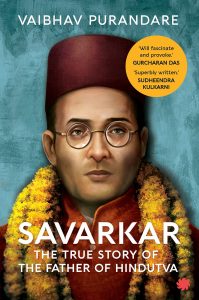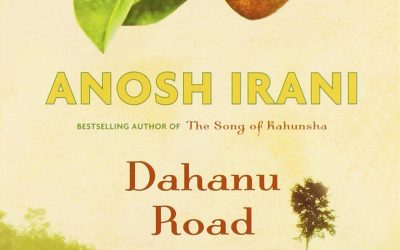
Mr. Purandare deals with and dismisses the ‘coward’ charge against Savarkar in the detailed foreword itself, thus cautioning the far -left leaning readers that if it is validation they are seeking, they are likely to be disappointed. In such polarized environment, it is a courageous decision and appreciation is due to both the author and the editor. After taking us through Savarkar’s hardscrabble childhood and his efforts at organization during his school days, the book narrates the incidents surrounding the assassination of Curzon Wyllie by the freedom fighter Madanlal Dhingra in London, and the shadow of British law that fell upon Savarkar as a result. Savarkar was soon shipped to India to stand trial and sentenced to two life sentences (fifty years) at the dreaded kaala-paani jail at the Andaman Islands.
The description of hardships and torture that Savarkar, his brother and others like them went through are at times too hard to even read. At the same time, we also see how efforts to release Savarkar and his brother from Andaman were ongoing almost from the time Savarkar set foot on the penal island and thus it puts his subsequent petitions into the context of a mere tactical ploy. We also learn how he opposed fast-unto-death as a protest tool and in fact went on a hunger strike himself only to force another revolutionary into breaking his fast. With the British raj bringing the full weight of their brutally oppressive power to bear upon him, Savarkar showed amazing amount of pragmatism and ‘bachenge to aur bhi ladenge’ spirit.
Back on the mainland and confined to Ratnagiri district, Savarkar, contrary to propaganda, continued to test the very boundaries of the conditions of his release, at times writing with pseudonym, at times taking an outright risk. He also focused on social reforms within the geographical area his release conditions restricted him to. As we read his utilitarian opinion about cow, as well as his disdain about the ritualistic aspects of religion, one can’t help having the feeling that in many ways, Savarkar could just as easily have been an icon for the left.
After a promising show in the initial elections, Hindu Mahasabha’s performance quickly fizzled out and Savarkar didn’t really have too many cards to play with as he tried to address the unlikely task of thwarting Jinnah and the creation of Pakistan. Judging decisions taken in real time, with unprecedented human costs at stake, is a perilous venture at best, and personally, just as I extended a similar benefit of doubt to Nehru and Patel while reviewing Hindol Sengupta’s biography of Sardar Patel, I would like to refrain from commenting upon the merits of Savarkar’s and Hindu Mahasabha’s positions including his encouragement to Hindus to join the armed forces, and his willingness to work with the Muslim League provincial government in order to keep them in check from within.
Apart from the mercy petition, Gandhi assassination remains one of the most polarizing incidents of Savarkar’s public life. The author provides us some previously unknown insights, including an alleged meeting between Ambedkar and Savarkar’s counsel where Ambedkar allegedly said that the order to “fix” Savarkar had come from the very top. A lot of people might concur with Sardar Patel when he held Savarkar morally if not legally culpable for Gandhi assassination, and from the writing one gets a feeling that Mr. Purandare feels so too. Whether Patel ever mustered the courage to turn the light of judgement upon his political mentor, and ask if Gandhi himself could have been similarly held culpable for the appalling genocide of Hindus during partition, is left unanswered here too.
Gandhi assassination is not the only episode where the author is critical of Savarkar. While discussing Savarkar’s literary work, we see how his post Andaman work suffered from his insistence of using fiction as a medium to express political views. As one critic puts it “the propogandist in him got the better of the playwright”. In Gandhi assassination as I have mentioned earlier, the feeling one gets is Mr. Purandare agrees with Sardar Patel’s opinion about Savarkar’s culpability. The author is also scathing of Savarkar’s post-independence views about how Hindus should treat Muslims. On the whole, through this praise-worthy book, Mr. Purandare has provided the much-needed research-based foundation that might help a truth seeker to arrive at a more balanced judgement of the icon’s life and times.
In today’s discourse, political figures are either feted far beyond their achievements, or demonized unfairly. In case of Savarkar, perhaps the unfairness of portrayal has been more pronounced due to the powerful lobbies involved. However, even seven decades of such propaganda has failed to make a dent in the public opinion which has always held the revolutionary in high esteem. That is why, noted humourist and Maharashtra’s biggest literary icon, the late Pu La Deshpande; in spite of holding political beliefs expressly opposite to those of Savarkar’s, described him as ‘a figure of titanic proportions against whom no amount of vicious attacks and propaganda would work.’
Pu La always had the right things to say, didn’t he?




0 Comments